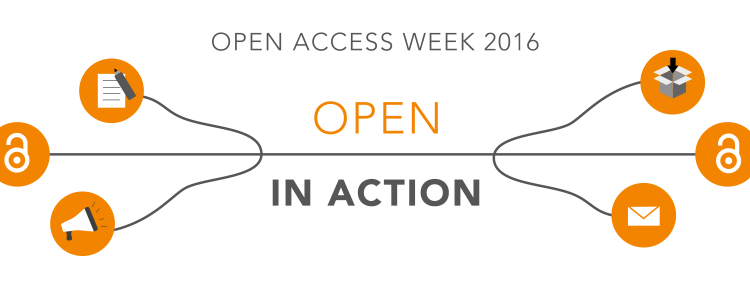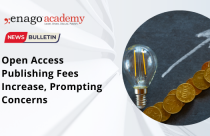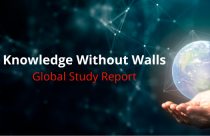Open Access Week 2016: Open In Action

In 2008, SPARC and its partners in the student community established the International Open Access Week to increase the visibility of research and the impact it has on the community as a whole. Each year the Open Access Week has a unique theme to highlight the various challenges and developments that have taken place in open access publishing. This year, the Open Access Week will be held from October 24 to 30 and the theme is “Open in Action,” which involves taking definite steps to make research more open and also promote others to do the same. This event is an opportunity for universities, libraries, research institutes, and funding agencies to connect, address various issues, and introduce policies that will advance the growth of open access.
What is Open Access?
Open Access is a different model of publishing that has been developed in the past decade to help make research more openly available to a wide audience compared to the traditional model of publishing, where scientific studies are not openly available for a significant amount of time. This model allows unrestricted access to anyone so that they can read, download, cite, and re-use academic data without any financial or legal barriers. This term is also widely adopted by many publishers as a business model that allows research data to be made accessible online to everyone at no extra cost to the readers compared to the traditional subscription model wherein researchers or libraries have to pay a subscription fee for access to research articles.
The actual guidelines for open access publishing were formulated by the Budapest Open Access Initiative, the Bethesda Statement on Open Access Publishing, and the Berlin Declaration on Open Access to Knowledge in the Sciences and Humanities. These guidelines laid the foundations for open access movement in the last decade. For a visual understanding of the need for open access publishing, here is a short video by Nick Shockey and Jonathan Eisen explaining the benefits and advantages of open access publishing to the academic community.
What are the types of Open Access?
Gold Open Access: In this route, researchers can make their work openly accessible by publishing in an open access journal, but at times these journals may charge a fee in the form of Article Processing Charges (APC) which is typically paid by the researcher or his institution or funding agency.
Green Open Access: This is also commonly called as “self-archiving” and allows researchers to deposit their published article in a subject repository like arXiv for Physics or institutional repository and make it openly available after a specified embargo period given by the respective journal. In order to make their research accessible immediately, researchers can deposit pre-prints or post-prints of their work to these repositories but not the final published version.
Live Updates
- To celebrate the spirit of the theme “Open in Action” for Open Access Week 2016, Figshare1 is hosting a competition from 24th-30th October where they are inviting researchers to upload their open data to the Figshare repository and use the keyword “OA Week 2016” while publishing their data. The participants with the most viewed data in the Figshare Collections will receive prizes from Digital Science and Figshare. Every participant will also receive a badge on their Figshare profile for being a part of the competition.
- Wiley2, one of the world’s leading publisher welcomed this year’s Open Access Week by reflecting on some of the notable open access milestones that they accomplished in the past year and by focusing on some of the upcoming initiatives in the near future. Some of these achievements include Gold OA, Open Research Data, Open Recognition and Reward, and Open Collaboration to name a few.
- Figshare released a report detailing the results of a global survey of 2000 researchers to assess the global state of open data and sharing practices. This survey was conducted in association with Springer Nature and the report was supported by Digital Science.3 This report highlights a few points like the extent of awareness about open data, incentives for using it, and researchers’ views on making their research data openly available. The survey also showed that 80% researchers valued data citations more than article citations.
- Keeping in mind the theme of Open Access Week, “Open in Action,” The Wellcome Trust, one of the world’s largest research funding agencies has recently launched its new open access publishing platform, Wellcome Open Research4 that aims to allow researchers funded by the Trust to rapidly publish their research output within 7 days which then undergoes a post-publication peer review. This new open access model will benefit the scientific community by allowing accelerated dissemination of academic research.
- Researchers’ measure success through a number of metrics like h-Index, number of publications and impact factors. However, we all forget that, although we may commit to open access, there is a lack of metric to determine the work that is openly available. To change this, Impactstory5 has launched a new measurement for researchers called Open Access Score, which determines the percentage of each researcher’s work that is freely accessible online. Thus, Impactstory intends to help researchers around the world identify their score and take concrete initiatives to increase it and make research more open.
- In support of the Open Access Week, Portland Press6 is highlighting some of the best Open Access articles in its portfolio in a new collection of top open access articles that are accessible to all without a subscription. This collection includes research papers and review articles taken from the wide portfolio of journals that Portland Press publishes. This asserts their full commitment to open science and their mission to serve the needs of the community.
- This year’s theme for the Open Access Week7 focused on action being taken by researchers; hence, SPARC launched the Open Access Week Action Portal where researchers can indicate the steps they would take in order to support Open Access. The purpose of this portal is to capture the efforts of each researcher around the world, thus demonstrating the momentum to drive Open Access forward
- In the last decade, open access publishing has seen many changes take place and there is also evidence of a citation advantage by publishing in open access journals. However, researchers are still concerned that their choice of publishing in open access journals might have an effect in their case for promotion and tenure. To mitigate this concern among faculties, the librarians at IUPUI8 have tried to align the values of promotion and tenure with open access and found that engaging faculties as partners in faculty governance turned out to be very effective in bringing about changes in policies.
- ECS9 welcomed the Open Access Week by taking a bold decision to make its entire collection of 132,000 scientific articles freely available to all till the 30th October. They stated that this decision was a preview to their “Free the Science” initiative, which is a disruptive strategy whose objective is to make the entire ECS Digital Library open access by 2024.
On Twitter, you can track the hashtag #OAWeek to stay updated on the updates being shared by various publishers and agencies about open access publishing. Also, in this post, we will continue to keep sharing live updates on the Open Access Week 2016.
References:
- Figshare (2016, October 24) Open Data in Action – Open Access Week 2016. Retrieved from http://us4.campaign-archive1.com/?u=b2e79d17291e6cd4adac61495&id=25c72d7aaa&e=db8c044ff6
- Christine Thomsen (2016, October 24) Open Access in Action: A Look Back at 2016. Retrieved from https://hub.wiley.com/community/exchanges/discover/blog/2016/10/23/open-access-in-action-a-look-back-at-2016?elq_mid=9422&elq_cid=5104527
- Laura Wheeler (2016, October 25) The State of Open Data: Report Provides New Insights into the Global State of Open Data #stateofopendata. Retrieved from https://www.digital-science.com/blog/news/state-open-data-report-provides-new-insights-global-state-open-data-stateofopendata/
- Wellcome Open Research. Retrieved from https://wellcomeopenresearch.org/about
- The Impactstory team (2016, October 24) What’s your #OAscore? Retrieved from http://www.openaccessweek.org/profiles/blogs/whats-your-oascore
- Portland Press (2016, October 24) Open Access Week is here! Retrieved from http://www.portlandpresspublishing.com/content/open-access-week-here
- Nick Shockey (2016, October 12) Commit to Putting Open in Action this Open Access Week! Retrieved from http://www.openaccessweek.org/profiles/blogs/commit-to-putting-open-in-action
- Heather Coates (2016, October 26) How can open access work with promotion & tenure? Retrieved from http://www.openaccessweek.org/profiles/blogs/how-can-open-access-work-with-promotion-tenure
- The Electrochemical Society (2016, October 26) ECS takes down the paywall to free the science during open access week. Retrieved from https://www.eurekalert.org/pub_releases/2016-10/tes-etd101716.php









